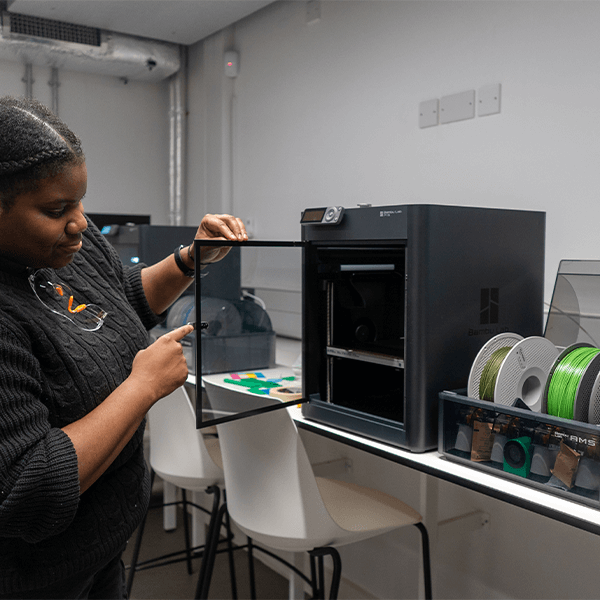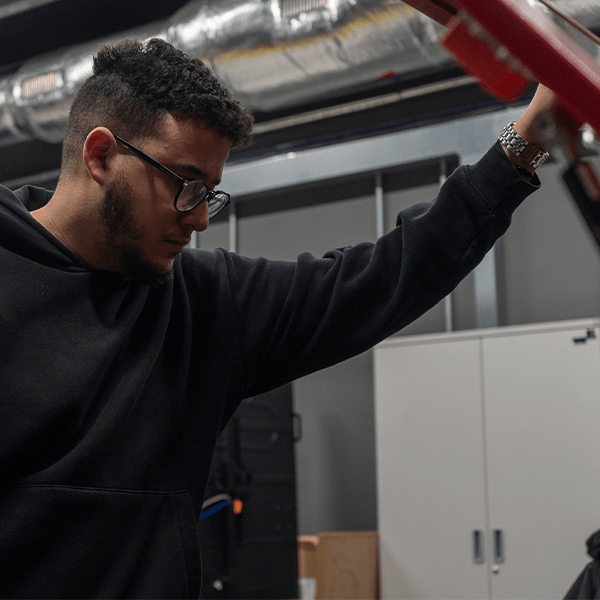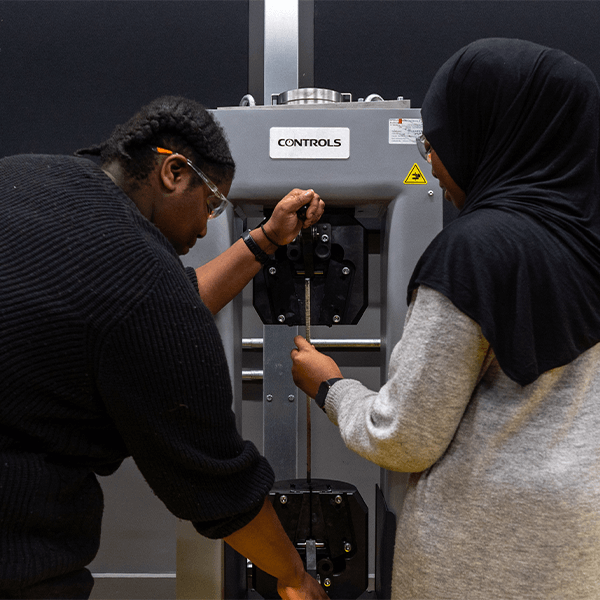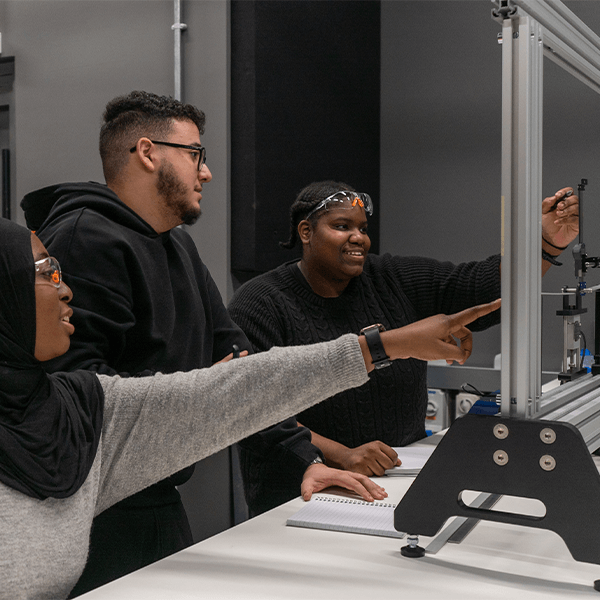/ Undergraduate /
Start date:
September 2025
Entry tariff:
112–128 UCAS points (or equivalent)
Foundation Year: 64–80 UCAS points (or equivalent)
CertHE: 40 UCAS points (or equivalent)
DipHE: 48–64 UCAS points (or equivalent)
UCAS code:
K240

On-Campus Open Day
Saturday 12 July 2025
Our Quantity Surveying programme offers a comprehensive education in cost and measurement, procurement and contracts, innovations in technology, financial management, and information management.
Did you know
We provide a world-class educational experience, with integration across disciplinary boundaries.
Top 3 modern university in London
(Complete University Guide 2025)

Ranked in the top 15% in the world
Times Higher Education Young University Rankings 2024

#8 in England for undergraduate student satisfaction
National Student Survey 2024

Foundation Year
This course can also be studied with a foundation year (September entry only).
Modules
Module overview:
In this module, you will explore the legal framework and governance structures that shape contemporary society. You will gain a foundational understanding of the English legal system, examining its key components and comparing it to other legal systems worldwide. You will investigate the sources of law, with a particular focus on common law, statutory law, and the legislative process.
Building upon this knowledge, you will explore the specific legislation and regulations that impact the built environment, including town and country planning, building regulations, health and safety laws, and professional codes of conduct. You will develop a critical appreciation of how these legal frameworks influence decision-making in construction and surveying professions.
How you'll learn:
Through case studies and real-world applications, you will learn to apply legal principles to practical scenarios. The knowledge and skills you acquire in this module will not only support your progression to levels five and six but also prepare you for the legal challenges you will encounter in employment within the surveying and construction sectors.
Module overview:
This module introduces you to the fundamental principles of construction technology and materials, focusing on their application in low-rise domestic buildings. It covers the mechanical and physical properties of materials, material selection for sustainability, and construction technology from foundations, walls, roofs and floors, together with building services.
How you'll learn:
You will spend time in our laboratories learning about the properties of different materials in terms of their strength and stability, and undertaking hands on, practical experiments. These experiments will be linked to your lectures and tutorials and many of the teaching weeks have classroom learning followed by lab sessions to consolidate your learning.
Module overview:
You will explore the economics of construction and the key factors that influence development. You will examine the role of the quantity surveyor in design economics and learn about fundamental economic concepts such as markets, supply, demand and resource allocation. By the end of the module, you will understand how economic principles shape construction design, cost planning, and financial control throughout the lifecycle of a project.
How you'll learn:
You will engage in discussions on how sustainability and social value impact cost planning, design choices, and long-term building performance. Throughout this module, you will develop essential analytical and problem-solving skills that are directly transferable to professional quantity surveying and cost management roles.
Module overview:
This is the first in a series of Interdisciplinary Design Projects that continue in each year of the programme. The module integrates the skills and knowledge acquired on the programme to date. However, it goes beyond that in terms of integration in as much as you will work within interdisciplinary groups from across the SETEC undergraduate programmes. Further, as the programme gains new cohorts, you will also work with students in ‘vertical’ cross-cohort disciplinary groups where you are given the opportunity for peer-to-peer learning.
The aim is to begin developing skills in design through a series of design tasks that require the development of a range of options that would satisfy the design problem, and introduce the ways that professionals work collaboratively in design. These projects will usually be related to one of the key contexts adopted by SETEC, e.g. the UN Sustainable Development Goals and industry collaboration. The modules, and the ensuing design modules provide the basis for a continuing process of self-reflection and personal development.
A design brief will be set that introduces you to challenges that provide context for design, construction and operation/maintenance of built environment artefacts. You will work in inter-disciplinary (and vertical cohort disciplinary where appropriate) teams, to identify and produce a concept design. You will learn about creativity in design, effective processes for rationalising ideas and solutions, how to integrate and balance professional roles and perspectives, and effective teamwork and communication of possible design solutions.
It will involve elements of design including form, function, space texture, balance, rhythm, emphasis, proportion and unity. It will involve producing designs expressed in hand drawings and computer aided drawings and physical models. It will also require plain language concise descriptions of the problem, the design process and the outcome design.
How you'll learn:
There will be taught elements by either lecture or seminar / workshops which include an introduction to ethics, equality and diversity, project planning, site layout, risk management, environmental assessment, Health and Safety management techniques, searching for relevant literature, summarising literature, writing of technical prose and critical thinking.
Please note, these modules may be subject to change.
Module overview:
In this module, you will explore three key themes: procurement, contract administration, and professional development. You will learn how procurement plays a vital role in securing goods and services to meet client requirements in construction projects. Through case studies and industry examples, you will analyze contract administration principles that define the roles and responsibilities of project stakeholders. You will develop problem-solving skills by evaluating procurement strategies and applying contract management techniques.
How you'll learn:
You will engage in hands-on activities, including industry-aligned projects, contract analysis, and professional development exercises. The module will introduce you to standard construction contracts, such as JCT, NEC, or FIDIC, which you will study in the context of real-world projects. Additionally, you will be introduced to property and employment law, broadening your understanding of legal considerations in construction.
Module overview:
The module builds upon the knowledge and understanding developed from the level 4 Construction Science, Technology and Materials 1 with a focus on the technology of high-rise frame construction and new methods of construction. You will develop a deeper understanding of contemporary construction technology principles in complex buildings including basements, their future adaptation and refurbishment options.
It addresses the superstructure to include types of frames and their different envelope systems and complex building services. The flexibility of the internal space and finishes is explained with the associated technology, including fire and life safety. It covers the safe disposal of buildings with consideration given to sustainability. Safe working practices are considered in the introduction to each element of construction technology as emphasised by the relevant code of practice.
Sustainability considerations will be integrated throughout the module, particularly in discussions on demolition waste disposal, alternative materials, and energy-efficient design.
How you'll learn:
By engaging with this module, you will develop analytical and problem-solving skills applicable to careers in architectural technology, construction project management, and sustainable engineering.
Module overview:
This module covers how construction organisation carries out estimating and costing, tendering and financial accounting and control along with human resource management practices.
You will be introduced to pre-contract quantification of construction work and the skills required for the preparation of Bills and Quantities. Furthermore, you will be introduced to computerised techniques for computerised BQ production methods based upon the group method of take−off and the use of standard libraries of item descriptions. This will include the interpretation of graphical and textual project information; mensuration techniques and conventional methods of booking and preparing dimensions.
Topics on tendering practices will concentrate on the construction manager’s responsibilities at tender stage. A full review and analysis of a live project brief tender documentation pack will develop your skills required to produce a professional tender submission; focusing on the design proposals, method statements, tender programme, logistics planning and risk management to produce a comprehensive technical submission.
You will develop understanding of how construction organisations manage their finances and human resources. The financial management covers management of finances in the project and accounting concepts and conventions, objectives of financial statements and their uses. You will develop an understanding of HRM functions carried out by the Construction Managers in developing and maintaining professional relationships with colleagues and partner organisations and explore
productivity improvement techniques are explored.
How you'll learn:
This module adopts a practice-based and experiential learning approach to ensure students engage in real-world construction management scenarios. The learning experience is designed to be research-informed and industry-driven, incorporating guest lectures from professionals, hands-on workshops using industry software, problem-based learning (PBL) activities, and collaborative projects. Lectures provide theoretical foundations, while seminars and tutorials focus on case studies, role-playing exercises, and critical discussions. The use of construction project simulations and live industry projects ensures that students develop both the technical and managerial skills needed for professional practice.
Module overview:
In this module you will apply the knowledge and skills acquired at Level 4 and during Level 5 to a multi-faceted design problem of a building or part of one, develop holistic design thinking, further embed approaches to design that are sustainable and carbon neutral, in particular novel materials, timber and reused or recycled steel and carbon accounting for construction, and to continue with self-reflection and collaborative practices with other disciplines. Further, the project will usually be related to one of the key contexts adopted by SETEC, e.g. the UN Sustainable Development Goals and industry collaboration. Further, where appropriate, you will also work with other students in ‘vertical’ cross-cohort disciplinary groups where you are given the opportunity for peer-to-peer learning.
The content is delivered in the context of a design project in which you play the role of a professional within your discipline within a broader design team. This module employs an experiential learning approach, integrating problem-based learning (PBL) and collaborative, interdisciplinary teamwork to simulate professional practice.
You will present your design appropriately using hand-drawn sketches, computer generated graphics, computer aided drawings, physical models, calculations, specifications, and bills of materials/ quantity. You will be developing your knowledge of computer assisted design and engineering in context and its value in terms of optimisation and parametric design.
How you'll learn:
The project has an individual component and a groupwork component. A combination of tutorial and design studio sessions will be used to generate the designs and track progress.
You will continue your planning and recording of self-learning and development as the foundation for lifelong learning / CPD. This will be continued within each Interdisciplinary Design Project at each level of the course.
Please note, these modules may be subject to change.
This course offers all students the option of a one-year paid work placement, to boost your employability even further. If you choose this route, you will take the placement following year two of your course, and then return to complete your degree.
Why take a placement?
A placement year is the perfect opportunity to gain valuable work experience, to build on the career skills we will teach you on this degree. The connections you make on the placement will improve your career prospects further, and equip you with the skills you need to secure graduate-level employment.
How we support you
The University's Placement and Work Experience Team are experts at helping you to secure a placement. They will work closely with you from the start, helping you research potential employers, discover placement opportunities, create and pitch your CV, and will coach you to perform well in interviews. We aren't able to guarantee a placement, but our sector-leading advisors will give you the best possible chance of securing one.
Find out more about how we'll support you
We understand that your plans might change once you start your programme. If you decide not to do a placement, you will have the option of completing the three year version of your programme.
Whatever your choice, you will have access to many opportunities for work experience through our Placement and Work Experience Team, and access to face-to-face and 24/7 online careers support.
Module overview:
This module builds on the knowledge and understanding of measurement, estimating, procurement, and contract administration developed earlier in the programme. You will cover a diverse range of topics, including advanced measurement, cost and risk management techniques, the use of digital software, and conflict/dispute resolution. By applying this knowledge to real-world scenarios, you will enhance your problem-solving skills and gain insight into the practical challenges faced by modern quantity surveyors.
How you'll learn:
A central focus of this module is the use of industry-standard software, equipping you with the data management and analysis skills increasingly sought by employers. You will also explore sustainability and life cycle assessments, learning how to calculate embodied carbon and utilise current guidance and tools. Upon completion, you will have a deeper understanding of the evolving role of quantity surveyors and the ability to apply advanced cost management practices that reflect both economic and environmental considerations.
Module overview:
In this module, you will explore fundamental theories and concepts of project management in construction. Construction projects are complex and provide challenges in managing resources mainly people, plant and materials, specialist subcontractors effectively. You are introduced to contemporary principles and concepts in project management and the processes, tools and methodologies that are utilised to complete the construction projects successfully are explored.
The relationship of project management with strategic objectives of the client organisation, quality, health and safety, risk management are covered. You will be introduced to time cost relationships and techniques of progress monitoring of the projects including the use of Building Information Modelling.
You will develop critical project management skills, including leadership, risk management, and stakeholder communication, preparing you for careers in construction, architecture, and infrastructure development.
How you'll learn:
Lectures will cover theories, process and techniques related to the subject, while seminars/ tutorials will consist of project-based tasks, problem solving and creative activities. There will be an additional 30 minutes of asynchronous digital support per week. This will consist of pre-recorded lectures, videos and other digital materials
Module overview:
This module provides you with the opportunity to independently investigate a selected topic of interest in a built environment related issue, and the scope may include, if appropriate, the development of a design. The design option is for students of who would like to carry out an individual design project and is primarily aimed at students who are enrolled on programmes that involve some level of design discipline. You will need to take responsibility for managing your time, identifying objectives and follow a systematic approach to explore, and possibly solve, a problem, or generate a design. It includes the production of a report of the investigative project.
You will select a topic for research or design provided by prospective supervisors, or they may propose a topic for research to the module leader who will seek a suitable supervisor. Proposed topics may be the subject of further discussion and development before they are mutually agreed by you and your proposed supervisor.
The project will typically be of an investigative nature, exploring and extending your knowledge of the chosen subject within the context of the construction industry. A design project will also require a good degree of investigation on your part. You are expected to demonstrate an understanding of fundamental principles of research, follow research ethics and appropriate methodologies for collecting and analysing primary and / or secondary data and communicate your findings to a professional standard. You will be required to submit an application for ethical approval for the research prior to any primary data collection involving human subjects. You will also need to develop a risk assessment for all practical work either in the field or laboratory.
How you'll learn:
There will be a programme of lectures and seminars at the beginning of the module to introduce you to research techniques and appropriate methodologies. This will include coverage of appropriate statistical techniques that you may need to adopt. Online resources will be provided to support the investigation. Specialist librarian support will be provided to help you with literature searches and use of software for citing articles and providing their bibliographies in a reference list. You are expected to show considerable initiative throughout the duration of the module and schedule supervision meetings with their supervisors.
Module overview:
In this module, you will further develop your ability to design larger-scale built environment artefacts of a more complex scale for a specific development site. The projects will usually be related to one of the key contexts adopted by SETEC, e.g. the UN Sustainable Development Goals and industry collaboration. You will also work with students in ‘vertical’ cross-cohort disciplinary groups providing additional opportunity for peer-to-peer learning.
You will conduct research on the background of the site and explore developments in design and construction practices and techniques. It will therefore contain research methods teaching, also required for the Investigative Project. This instruction will build on that provided as part of Integrated Design Project 1 and 2. You will develop your understanding and application of project planning, cost estimation, risk assessment, ethics, sustainability, and Equality, Diversity, and Inclusion (EDI). It will also cover matters connected with search and retrieval of academic and grey literature, constructing text which summarises current known knowledge, critical thinking, the construction of technical reports, and writing.
How you'll learn:
You will work collaboratively to develop built environment proposals for a concept scheme at a specified development site, which may include geotechnical, water design and transport (such as pedestrian and cycle access within the perimeter). Working in teams, you will be presented with a brief that they will need to interpret, and where necessary challenge, in order to develop a programme of integrated activity.
Please note, these modules may be subject to change.
This course is offered as a degree with foundation year – a four-year programme which provides an additional foundation year at the beginning of the degree, that will give you academic and practical experience, as well as the skills you need to ensure you are equipped to successfully complete your chosen degree.
Find out more about our degrees with a foundation year
Foundation programme delivered by the School of Continuing Education. The exact modules for our foundation programme are currently in development. For more information, please contact us.

Skills
Graduate with an advanced set of skills and professional expertise, ready for industry.
Quantity Surveyors manage the financial aspects of construction projects, ensuring they are completed within budget while meeting quality standards. They prepare cost estimates, budgets, and financial plans, conducting feasibility studies, and managing contracts and procurement. They monitor project expenditure, assess the value of completed work, and handle payments to contractors and suppliers. Quantity Surveyors also provide cost advice, manage risks, and ensure compliance with legal and regulatory requirements.
Throughout your time at Roehampton, you will develop your technical expertise, problem-solving, communication, and leadership skills. You will graduate ready to excel in the dynamic field of Quantity Surveying.
Learning
You will learn via a combination of lectures, workshops, group seminars, group tutorials, and practical experimentation.
As much as possible, students will be taught in interdisciplinary groups, in open studio spaces, and on projects. There will be some formal lectures in order to deliver discipline relevant knowledge, skills and attributes. Where this takes place, formal lectures will be kept to a minimum and will be followed up by interactive group seminar and tutorial sessions in the studio spaces.


Assessment
You’ll be set authentic assessments, meaning that your projects, tasks and exercises will replicate the working world of architectural engineering.
You will be assessed on a variety of things which will include the submission of technical reports, essays, in-class open and closed book tests, online assessments, and oral presentations. The programme includes both formative assessment, with respect to interim reviews and feedback / feedforward and summative assessment.
Careers
There are a number of opportunities for graduates of Quantity Surveying in the built environment sector, internationally, nationally, and regionally.
Many Quantity Surveying professionals work in Project Management, Cost consultancy and as Main Contractors. Quantity Surveying professionals can also play a key role in the building embodied carbon industry due to the increase in interest in these areas as we move towards a zero-carbon society.

Open days
Get a real taste of our campus, community and what it’s like to study at Roehampton
Applying
Full-time UK undergraduate students apply through UCAS.
Entry tariff
112–128 UCAS points (or equivalent)
Foundation Year: 64–80 UCAS points (or equivalent)
CertHE: 40 UCAS points (or equivalent)
DipHE: 48–64 UCAS points (or equivalent)
Looking to work out your UCAS points or find out about our entry requirements? Find out more.
When we consider applications to study with us, we form a complete view of your achievements to date, and future potential, and can offer flexibility in entry requirements. Find out more about our Contextual Offer scheme.
Specific entry requirements
GCSE in English and Maths.
General entry requirements
September 2025 entry tuition fees
UK (home) tuition fees
Undergraduate degree: £9,535
Foundation Year: £9,535
CertHE / CertDip: £9,535
We offer a wide range of scholarships and bursaries. See our financial support pages for UK students.
We also provide other ways to support the cost of living, including free buses and on-campus car parking, hardship support and some of the most affordable student accommodation and catering in London. Find out more about how we can support you.
International undergraduate students apply through our direct application system.
Entry tariff
Looking to work out your UCAS points or find out about our entry requirements? Find out more.
When we consider applications to study with us, we form a complete view of your achievements to date, and future potential, and can offer flexibility in entry requirements. Find out more about our Contextual Offer scheme.
Specific entry requirements
GCSE English and Maths or equivalent.
General entry requirements
September 2025 entry tuition fees
EU and international tuition fees
Undergraduate degree: £19,500
Foundation Year: £19,500
CertHE / CertDip: £19,500
International Foundation Pathway: £16,950
We offer a wide range of scholarships and bursaries. See our financial support pages for international students.
We also provide other ways to support the cost of living, including free buses and on-campus car parking, hardship support and some of the most affordable student accommodation and catering in London. Find out more about how we can support you.





